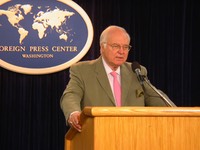MORE ARTISTIC TALENT PER STUDENT THAN ANY
OTHER CAMPUS IN AMERICA
By Michael Novak
I was impressed but not convinced when a young actress
who graduated from the University of Dallas – which some think
has been the premier Catholic campus in America – visited Ave
Maria the other day, and reported on a blog that she saw Ave
students give a Shakespeare performance better than any other
she had seen on the stage anywhere, and she had seen scores of
them, and acted in some. She wrote that only in Dallas, she had
thought, was there such spirit and talent and school élan. The “As
You Like it” at Ave, she wrote, gave Ave theatre a leapfrog to the
top.
Now among the smaller Catholic campuses vying to be “the
best” there is a considerable rivalry for bragging rights in any area
whatever. Dallas, Steubenville, Christendom, Aquinas in LA,
Belmont Abbey, and the newest kid on the block, Ave Maria, each
tend to think they are the best. (Competition in this and in much
else is mutually strengthening. It is a blessing to have wonderful
competitors).
Last night it was my turn to see the show, and I am still
exhilarated. The actors and actresses came from a single class,
Michael Novak
 Michael Novak is an American Catholic author, philosopher, and theologian. He received the 1994 Templeton Prize for Progress in Religion. For a complete biography and list of publications, visit MichaelNovak.net.
Michael Novak is an American Catholic author, philosopher, and theologian. He received the 1994 Templeton Prize for Progress in Religion. For a complete biography and list of publications, visit MichaelNovak.net.
Professor Travis Curtright’s, in
Shakespearean Performance. The cast
simply adapted a large classroom into a
“Theater in the Round” (well, three sides).
They wrote and adapted their own music,
in the spirit of the play, while the audience
assembled, during the intermission, and
(not a little) throughout the play.
Marvelous music, sprightly, with some
haunting new love songs familiar to the
students in the audience (but not to me),
who joyfully sang along. The music,
arranged by Philip Barrows of Frederick,
Md. (a veteran of high school musical comedies, like several
others in the cast, plus a few from big city Children’s Theaters),
was emblematic of the performance – it was developed by the
students in their own idiom and their marvelous talents (male
and female) for flirtation with the audience.
Somehow the cast made Shakespeare’s their own language
– it was their own private language, not a Shakespearian recital of
clever lines. Their emotions were invested in their own memories
and instincts. They played the twenty-somethings in the text as
themselves, with their own loves, thrills, frustrations, deceptions.
It wasn’t Shakespeare, it was themselves. And they were very
compelling and vivacious persons.
My wife Karen and I had season tickets to the Shakespeare
Theater in Washington, D.C., for thirty years, so I suppose we saw
about 150 performances. There were only a handful that we did
not enjoy – a bit heavy-handed in their messaging. We came from
nearly all thrilled, even ennobled.
"Somehow the cast made
Shakespeare’s their own
language – it was their own
private language, not a
Shakespearean recital of
clever lines. Their emotions
were invested in their own
memories and instincts."
However thrilling many of them were, I can’t recall any
that struck me with such immediacy, spontaneity, sheer
youthful joy and romance, as came alive last night in that
hastily arranged classroom space. It was, I imagined, not a
little like some of the spaces Shakespeare once used, at
Blackfriars, for instance.
The professionals in Washington – and delightful the
repertory players have been – seemed always to play their parts
so well. Here the students used Shakespeare to release
themselves. I suspect that some of the girls – the lovely Rosalind,
for instance – had had no idea before that she could be so
flamboyantly flirtatious and so overcome with glee (pumping her
feet up and down and letting her arms break forth with cheer,
before resuming normal voice) at hearing her beloved say (when
he still thought her a boy) how he loved Rosalind.
Over at the pub afterwards, thronged for a boisterous
Senior Night, another faculty member and I were still feeling the
exhilaration hours afterward. And it was a joy to see the actors
and actresses now at the Pub, back in the normal proletarian
dress which college students assume these days (shorts of frayed
jeans, tank tops, for the guys undershirts over workout muscle).
When you consider that in our School of Sacred Music, in
its associated choirs, singing groups, and glee club over two
hundred of Ave’s current 750 on-campus students participate.
And when you hear the singers and guitarists and flautists play at
the Pub’s open-mic “Saturday Nights Live” and - oy vey! - its
comedians, the amazement does filter over you about the artistic
talents in this student body. It is stunning.
